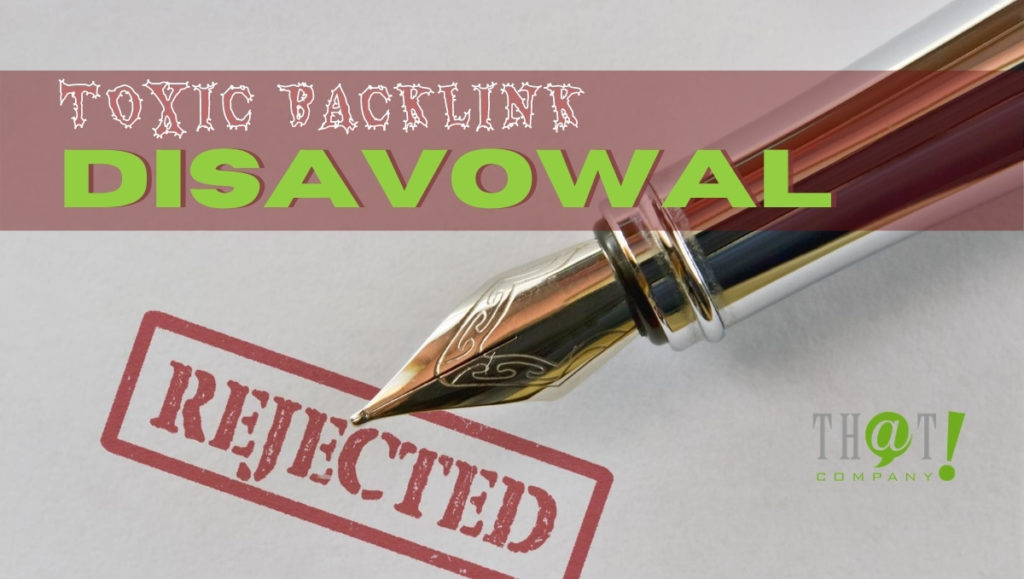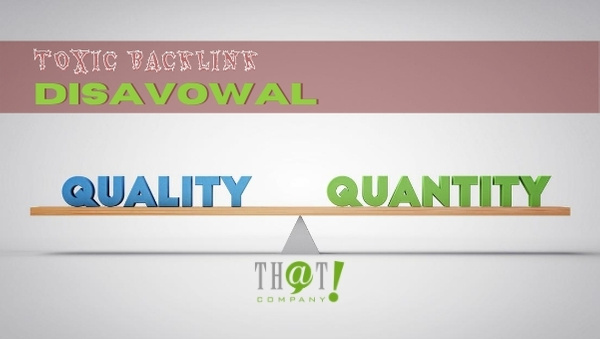 Many have heard of toxic backlink disavowal, but how many use it? The Google Disavowal Process Tool has been around since 2012, and it has been a valuable tool for SEO managers and website operators. The benefit of disavowing links is that you are telling Google that you do not appreciate the bad links that are coming your way. Since we cannot control what other people do on their website, the best thing we can do is ask nicely for links to be removed, and if they are not, then we ask Google to ignore them through the Disavowal Tool.
Many have heard of toxic backlink disavowal, but how many use it? The Google Disavowal Process Tool has been around since 2012, and it has been a valuable tool for SEO managers and website operators. The benefit of disavowing links is that you are telling Google that you do not appreciate the bad links that are coming your way. Since we cannot control what other people do on their website, the best thing we can do is ask nicely for links to be removed, and if they are not, then we ask Google to ignore them through the Disavowal Tool.
The Benefits of Disavowal
By disavowing bad links, we can see a marked increase in our overall rankings as the bad links stop hindering our search visibility. If disavowing is done improperly, it can spell disaster for a site instead, which is why it is crucial to understand how to use it and then to use it appropriately.
There are reasons why one would not disavow links to their site, but if you desire to improve your site’s ranking, have had an active backlink creation strategy at some point, or have not viewed your backlinks in a while, then you want to consider disavowing links. It is possible that you do not have any links to your site that need to be disavowed, and if so, that’s great! However, it does not mean that you will not need to keep an eye on the links pointing at your site. Even backlink strategies need to be reviewed to see if anything has changed on those websites that would make links from them appear to Google as negative. Of course, if you want to build your rankings, then you need to actively engage with everything related to your site, including links directed to your site.
Toxic Backlink Disavowal Factors
 There are two significant factors to look at when considering which backlinks to disavow. The first deals with the number of incoming backlinks and the other is the quality of the links. Some tools allow you to verify the number of links, even Google Search Console, though there are better tools available. You need to evaluate how many links are coming to your site from a domain and determine if that is unusual for that domain. It takes a bit of investigating if you are not sure of that domain’s quality.
There are two significant factors to look at when considering which backlinks to disavow. The first deals with the number of incoming backlinks and the other is the quality of the links. Some tools allow you to verify the number of links, even Google Search Console, though there are better tools available. You need to evaluate how many links are coming to your site from a domain and determine if that is unusual for that domain. It takes a bit of investigating if you are not sure of that domain’s quality.
This brings us to the next factor, quality. Quality has its own subfactors, which include looking at the content surrounding the link, the anchor text for the link, and if there are multiple links on the page. One other subfactor that is often overlooked is the need to look at the other links on the content in question and investigate where those links go. Google looks at all links on a page, and now that “no follow” is a guideline and not a rule, you too should look at all the links on the pages that are linking to you. Some tools can help give you an idea of these subfactors, but the best way to determine the quality is to look at it yourself or hire someone to do it for you.
What Should You Disavow?
The two major factors will put you in the right direction, so you do not accidentally disavow good websites. When you have your list, and it is okay if you miss some sites in your initial overview, you will want to spend time viewing them. One of the best ways to do so will be to use the Internet Archive, also referred to as the Wayback Machine. With this free site, you can not only check on what it looks like now, but you can go back in time to what the site looked like in the past. You may not be able to see every page, but you can see if the site has changed dramatically, which can affect the quality of the link you are now receiving.
Nefarious Backlinks
Using this method of checking what a site looked like in the past can help you identify if the site had let the domain expire and be picked up by someone else. Sometimes, you will have people who will take a domain and use them for nefarious purposes. They will scrape or template content, hoping to receive the site’s benefits before the domain expired. Any website that is an expired domain needs to be disavowed without exception. Whatever benefit you may have collected from these sites is no longer there, and if they are still showing up in your backlink profile, then there is a problem that needs to be addressed.
One type of site you may not be aware of that needs to be disavowed are press release sites. If your company uses press releases, that is fine, but they need to be “no-follow” links. If you cannot ensure that they are treated as such, then a disavowal is in order. It is a good idea to disavow them regardless so that you are covered if they happen to turn their links into “follow” links at some later date. Google has explicitly mentioned that according to their Google Linking Guidelines, using press release backlinks is a violation of their Webmaster Guidelines.
[bctt tweet=”Directory links have lost credibility over the years and are no longer considered beneficial.” username=”ThatCompanycom”]Affiliate Backlinks
 Does your company use affiliate backlinks? If so, then you need to pursue disavowal of these links as well. This does not mean that you must have your affiliates remove their links, it just means that you need to make sure Google knows that you are not trying to gain benefit from having a bunch of paid backlinks. This also means that you need to disavow any links to your site from any coupon or deals websites or price comparison websites.
Does your company use affiliate backlinks? If so, then you need to pursue disavowal of these links as well. This does not mean that you must have your affiliates remove their links, it just means that you need to make sure Google knows that you are not trying to gain benefit from having a bunch of paid backlinks. This also means that you need to disavow any links to your site from any coupon or deals websites or price comparison websites.
Directory & Forum Backlinks
Tackling two birds with one stone, you want to complete the disavowal of all directory and off-topic forum backlinks. Both provide no benefit to your site, and you need to inform Google that you view them as non-beneficial. Directory links have lost credibility over the years and are no longer considered beneficial. As for the off-topic forums, these should be self-evident. If you are receiving links from a forum that has nothing to do with what your business is about, then you need to disavow those links. On-topic forums can be fine, but they need to be evaluated regarding overall relevance.
Disavowal of Paid-For Backlinks
 Lastly, you want to wage a disavowal process on any paid blog backlinks. This can be an issue of the past that needs to be addressed as most sites do not generate new paid blog backlinks. If you happen to own the blog sites or have access to those who do, then the best option is to have the links removed permanently rather than disavowing them. These are some of the worse links that you could have, especially if they are also on blog sites that are not relevant to your company.
Lastly, you want to wage a disavowal process on any paid blog backlinks. This can be an issue of the past that needs to be addressed as most sites do not generate new paid blog backlinks. If you happen to own the blog sites or have access to those who do, then the best option is to have the links removed permanently rather than disavowing them. These are some of the worse links that you could have, especially if they are also on blog sites that are not relevant to your company.
Disavowing backlinks is both an essential step to helping your website and something that people may not think about. Disavowal of a link can also be dangerous if you are not careful what sites you are disavowing. You do not want to disavow a site whose links are helping your site. While it is crucial to disavow bad links, if you are not sure if a link is bad, it is better to err on the side of caution and leave the link alone for now. Your best bet is to hire someone who knows what to look for beyond what is mentioned here and who knows the risks and will take the necessary precautions.





























